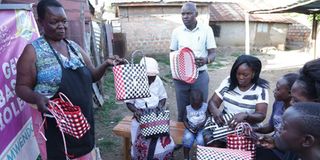Covid-19 caused 92.2pc spike in gender-based violence

Women learn how to weave bags at Yatima Hope CBO in Nyalenda slums in Kisumu, a gender-based violence support group centre. More women have experienced GBV during the Covid-19 period.
What you need to know:
- National Crime Research Centre says cases of gender-based (GBV) increased by 92.2 per cent between January and June, this year.
- 71 per cent of the 2,416 cases of GBV recorded during the period were perpetuated on women and girls.
- Males aged between 18 and 33 years as main perpetrators of the vice.
- There was also an increase in girls procuring abortions, engaging in drug abuse, being neglected, sexually violated by family members and confined unlawfully.
Cases of gender-based (GBV) increased by 92.2 per cent between January and June, this year, National Crime Research Centre (NCRC) has established.
On July 6, Mr Kenyatta tasked the agency to probe rise in teenage pregnancies and GBV in the country amid the Covid-19 pandemic.
The agency was given 30 days from July 6, to study underlying causes of the spike and prepare an advisory on redress measures.
“I am indeed concerned of the increased tensions within our homes. Cases of gender-based violence have increased, mental health issues worsened and instances of teenage pregnancy have also escalated,” noted Mr Kenyatta during his State address on phased reopening of the economy when he issued the directive.
Six-month period
In its review, NCRC, established that 71 per cent of the 2,416 cases of GBV recorded during the period were perpetuated on women and girls. That is equivalent to 10 females violated each day during the six-month period.
The agency identifies males aged between 18 and 33 years as main perpetrators of the vice in its report on Protecting the Family in the Time of Covid-19 Pandemic: Addressing the Escalating Cases of Gender-based Violence, Girl Child Disempowerment and Violation of Children Rights in Kenya.
In the months of April to June, when the government had effected strict anti-Covid-19 containment measures, a spike in 20 different forms of GBV against women, girls and children was recorded.
These include defilement, attempted rape, rape, subjecting children to torture, attempted defilement, gang rape and gang defilement.
Child prostitution
Cases of threatening to kill, attempted murder, arson, sexual communication with a child, sexual abuse, physical abuse and child abduction and kidnapping were also rife.
Other increased GBV offences were emotional abuse, child marriage, Female Genital Mutilation (FGM), child prostitution, child radicalisation and online abuse.
But girls suffered the most from defilement, attempted defilement, child marriage, teenage pregnancy and FGM.
There was also an increase in girls procuring abortions, engaging in drug abuse, being neglected, sexually violated by family members and relatives and confined unlawfully.
Retrogressive practices
The review notes alcohol, drug and substance abuse alongside poverty and domestic disputes as some of the reasons behind the increase in GBV in Kenya during the Covid-19 period.
Other underlying factors are retrogressive cultural practices, especially religious beliefs, male dominance, poor parenting, identity crisis among youth and inadequate support system.
“There is a link between dysfunctional socio-cultural value system within the family and the increasing cases of gender-based violence, violations of children’s rights and girl child disempowerment,” the agency concludes in its report.
It recommends the Ministry of Education to strengthen the curriculum and school syllabus that address child rights, reproductive health and sex education in schools. This, it says, could empower girls and boys to speak out against violations of their rights.





